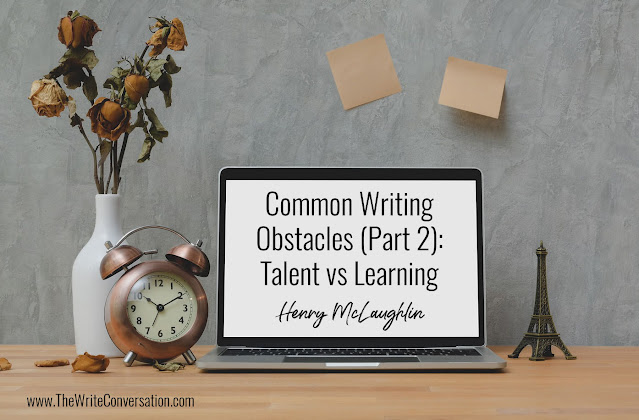by Henry McLaughlin @RiverBendSagas
“You’re not a writer. You’re not even published.”
My superior at my day job spoke these words many years ago. They were his response when my immediate lead told him I was writing.
Talent has been described as something you either have or you don’t. You can’t learn it.
I and many others disagree with this notion. You can learn to be a writer whether or not you have talent.
The Difference Between Writing Talent and Learning
There are many gifted writers who seem to have been born with a natural talent for writing. I think of columnist George F Will and William Buckley, the founder of National Review. Writers like Hemingway, Asimov, Bradbury, Elmer Kelton, Dorothy Sayers, and others seem to write at a level we mere mortals can only think about approaching.
Yet, there are many authors who compose excellent stories that touch our hearts. Harper Lee’s To Kill a Mockingbird for one. Mark Twain is another. I’m sure we can all name writers who are superb to us. The funny thing is, they excite some readers and leave other readers cold.
Many, many factors go into being a brilliant writer. One frequently overlooked is it is quite possible to learn how to write significant stories. People learn how to be actors. They can learn to be writers too.
- One key to learning to write is believing it’s possible.
- Another is to accept learning to write as a lifelong process.
We’ll refine our voice and our style with each project. We’ll learn about ourselves and how each of us can get better.
Take two people and give them a one sentence prompt. You’ll have two different stories. Each will have unique characteristics influenced by the individual writer’s life story, history of reading and writing, and their view of the world, and how the pizza they had for breakfast is settling in their stomach.
We’ve heard the cliché—to be a writer, you must be a reader.
It’s a cliché because it’s true. If we’re not reading what others write, we’re not learning. It’s important to read outside our genre to discover how other genres create story worlds, build plots, and develop characters. We need to be voracious readers.
We must also be students of what we read.
If I’m struggling with my story world, I’ll read or reread favorite authors who excel in this area—writers like Orson Scott Card, Morgan Llywelyn, Elmer Kelton, and Jacqueline Winspear.
For dialog, I’ll turn to Robert B. Parker, Terry Pratchett, and Steven James and others.
Besides reading, we need to get to a place where we can learn with and from others. Seminars, workshops, small groups, and conferences are all places to gather and learn. Working with a mentor or coach one-on-one is another way many writers develop confidence in their abilities.
Conferences will sometimes have special tracks that will meet daily over the course of the conference—a great way to dig deep into a topic while being with a community of other eager learners.
And there are books on the craft. There are a lot of books on the craft. Those that have helped me the most are Plot and Structure by James Scott Bell, Story Trumps Structure by Steven James, and Orson Scott Card’s Character and Viewpointand How to Write Science Fiction & Fantasy (1990). Don’t let the last the title fool you. Many of the principles Card describes to Sci-Fi are also helpful in other genres as well.
What are some ways you have developed your talent?
TWEETABLE
Don't Miss the Rest of the Posts in This Series!
Image to Share on Pinterest!

%C2%A0%20Talent%20vs.%20learning.jpg)

Henry,
ReplyDeleteThanks for this terrific article about talent vs life-long learning. While I've been writing for decades, I continue to learn new aspects all the time--a key part of this business of publishing.
Terry
author of Book Proposals That $ell, 21 Secrets To Speed Your Success (Revised Edition)
Thank you, Terry.
DeleteIndeed, writing is a skill and skills can be learned and improved.
ReplyDeleteGreat inspiring post, Henry.
Thank you, Ingmar.
ReplyDeleteThank you for this uplifting message. I have been in a funk due to health issues and the COVID restrictions. I have had difficulties trying to find an outlet for my Christian essays. But you have given me new courage to keep trying. Peace and blessings to you.
ReplyDeleteGreat advice, no matter where we are in our writing. And I really agree with your point that we are life-long learners, not just in writing, but in ever aspect of our lives. Thank you for sharing your wisdom with us, Henry.
ReplyDeleteWhen I started writing some 30 years ago, my family laughed. Didn't think I had it in me to pursue a real career. At times, I didn't either. But I kept at it and did, eventually, publish with many pubs, including Kensington, Penguin and Harlequin. I even went on to win a few industry awards and my 2021 Love Inspired debut was a Publisher's Weekly bestseller. It's always possible if you put in the time, the study and the work.
ReplyDelete